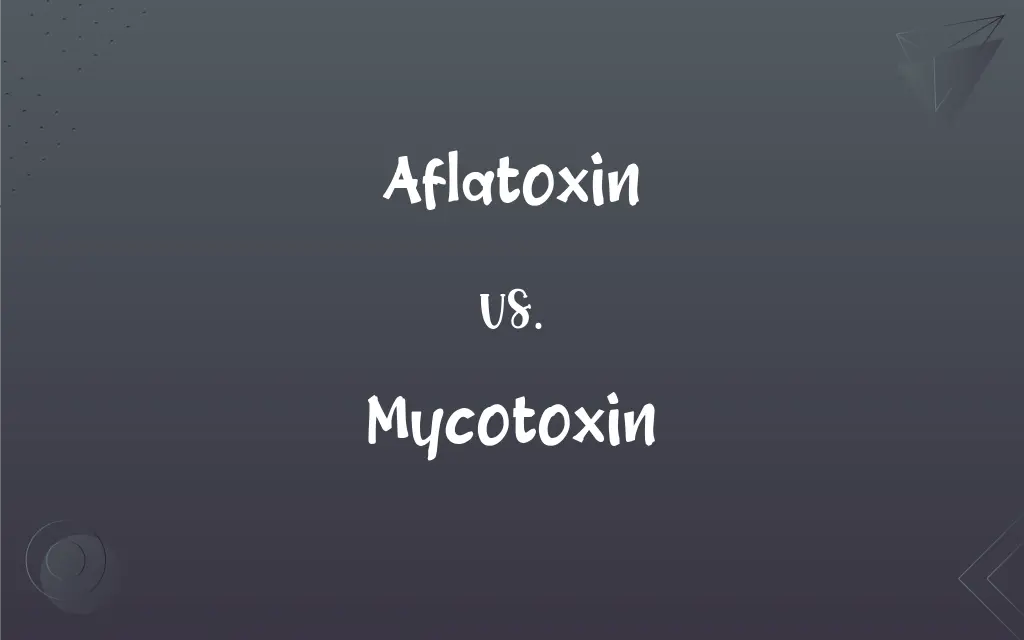Aflatoxin vs. Mycotoxin: What's the Difference?
Edited by Aimie Carlson || By Janet White || Published on February 25, 2024
Aflatoxin is a specific type of mycotoxin produced by Aspergillus species; mycotoxins are a broader group of toxic compounds produced by fungi.

Key Differences
Aflatoxin is a specific mycotoxin produced primarily by Aspergillus species of fungi, known for its potency and carcinogenic properties. Mycotoxins, on the other hand, are a diverse group of fungal toxins affecting various food crops and products.
Aflatoxins are notorious for contaminating crops like peanuts and corn, posing serious health risks when ingested. Mycotoxins, including aflatoxins, can cause a range of health issues from acute poisoning to chronic diseases in humans and animals.
The chemical structure of aflatoxins makes them highly toxic and stable under various conditions. Mycotoxins, as a group, vary widely in their chemical structures and include a range of toxic compounds beyond aflatoxins.
Detection and regulation of aflatoxin levels are crucial for food safety, especially in warmer and humid regions. All mycotoxins, including aflatoxins, are subject to strict regulatory limits in food products to ensure safety.
Research on aflatoxin focuses on its occurrence, prevention, and mitigation in food crops. The study of mycotoxins encompasses a broader scope, investigating various fungi and their toxins across multiple environments.
ADVERTISEMENT
Comparison Chart
Source Fungi
Primarily Aspergillus species
Various fungi
Health Risks
Potent carcinogen, acute poisoning
Range from acute to chronic diseases
Chemical Structure
Highly toxic and stable
Varies widely
Affected Crops
Common in peanuts, corn
Affects a variety of food crops
Research Focus
Occurrence and mitigation in specific crops
Broad study of various fungi and toxins
ADVERTISEMENT
Aflatoxin and Mycotoxin Definitions
Aflatoxin
A toxic compound affecting crops like corn and nuts.
Aflatoxin levels in stored grains must be carefully monitored.
Mycotoxin
A group of substances including aflatoxins, ochratoxins, etc.
Different mycotoxins pose varying health risks in foods.
Aflatoxin
A mycotoxin known for liver damage and cancer risks.
Aflatoxin exposure is closely linked to liver cancer.
Mycotoxin
Toxic compounds produced by various fungi.
Mycotoxin contamination in crops can lead to foodborne illnesses.
Aflatoxin
A potent carcinogenic mycotoxin from Aspergillus fungi.
Aflatoxin contamination in peanuts can pose serious health risks.
Mycotoxin
Chemicals causing diseases in humans and animals.
Mycotoxin exposure is a significant concern in animal feed.
Aflatoxin
A stable toxin resistant to heat and processing.
Aflatoxin remains a concern even in processed food products.
Mycotoxin
Regulated substances in the food industry.
Strict limits are set for mycotoxin levels in food products.
Aflatoxin
A regulated food contaminant due to its toxicity.
Food industries rigorously test for aflatoxin to ensure safety.
Mycotoxin
Fungal toxins with diverse chemical structures.
Mycotoxin research focuses on their identification and effects.
Aflatoxin
Any of a group of toxic compounds produced by certain molds, especially Aspergillus flavus, that contaminate stored food supplies such as animal feed and peanuts.
Mycotoxin
A toxin produced by a fungus.
Aflatoxin
(poison) Any of a family of mycotoxins, produced by molds of the Aspergillus genus, that can be toxic, carcinogenic, mutagenic or teratogenic; typically found as contaminants of animal food or peanuts.
Mycotoxin
(biochemistry) Any substance, produced by a mold or fungus, that is injurious to vertebrates upon ingestion, inhalation or skin contact.
Aflatoxin
A potent carcinogen from the fungus Aspergillus; can be produced and stored for use as a bioweapon
Mycotoxin
A toxin produced by a fungus
FAQs
What is aflatoxin?
Aflatoxin is a carcinogenic mycotoxin produced by Aspergillus fungi.
Can mycotoxins be found in all fungi?
Not all fungi produce mycotoxins; it depends on the species.
What are mycotoxins?
Mycotoxins are toxic compounds produced by various fungi.
How harmful is aflatoxin?
Aflatoxin is highly toxic, causing liver damage and cancer.
Are aflatoxins heat stable?
Yes, aflatoxins are stable and resistant to heat and processing.
What foods are commonly affected by mycotoxins?
Mycotoxins can contaminate grains, nuts, fruits, and other crops.
Is aflatoxin contamination common?
It's common in warm, humid climates, especially in stored grains and nuts.
Are there different types of mycotoxins?
Yes, mycotoxins include various toxins like aflatoxins, ochratoxins, etc.
How are mycotoxins detected in food?
Through various testing methods including chemical analysis.
Do mycotoxins affect animal feed?
Yes, they can contaminate animal feed, affecting livestock health.
What preventive measures exist for aflatoxin?
Preventive measures include proper storage and moisture control.
Is aflatoxin testing mandatory for certain foods?
Yes, many countries require aflatoxin testing for high-risk foods.
Can aflatoxin be removed from contaminated food?
Removing aflatoxin is challenging due to its stability in food.
How are aflatoxins regulated?
Aflatoxins are subject to strict regulatory limits in food products.
Are aflatoxins found only in certain countries?
Aflatoxin contamination is more prevalent in tropical and subtropical regions.
Can mycotoxins cause acute poisoning?
Yes, some mycotoxins can cause acute toxicity.
Can mycotoxin contamination be prevented?
It can be minimized with good agricultural and storage practices.
Can mycotoxins affect the economy?
Yes, mycotoxin contamination can lead to significant economic losses in agriculture.
Can cooking destroy aflatoxin?
Cooking does not effectively destroy aflatoxin.
How do mycotoxins affect human health?
They can cause a range of health issues, from allergies to chronic diseases.
About Author
Written by
Janet WhiteJanet White has been an esteemed writer and blogger for Difference Wiki. Holding a Master's degree in Science and Medical Journalism from the prestigious Boston University, she has consistently demonstrated her expertise and passion for her field. When she's not immersed in her work, Janet relishes her time exercising, delving into a good book, and cherishing moments with friends and family.
Edited by
Aimie CarlsonAimie Carlson, holding a master's degree in English literature, is a fervent English language enthusiast. She lends her writing talents to Difference Wiki, a prominent website that specializes in comparisons, offering readers insightful analyses that both captivate and inform.
































































